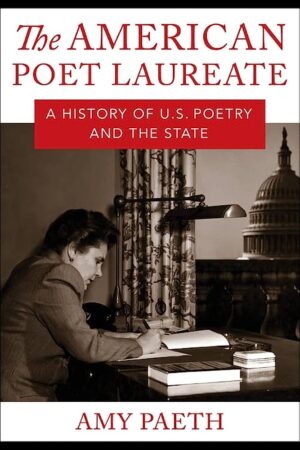The American Poet Laureate: A History of US Poetry and the State
by Amy Paeth
reviewed by Christina Obolenskaya
Poetry seems far removed from the inner workings of Congress, but at one point poets were active participants in Cold War cultural programs. Even now, the federal government has a stake in the field of poetry, albeit from a distance. In The American Poet Laureate, her new sociological study of postwar poetry, Amy Paeth unravels the ties that have long subsisted between poets, the state, and private entities. Her stated intention is to enhance “our understanding of the role of poetry in civic life.” Having spent over a decade in the Library of Congress archives, Paeth is well equipped to tell this history of the social and cultural forces that have shaped American poetry, consulting poets like Tracy K. Smith and Raquel Salas Rivera to root her analysis in the present day.
The main poets Paeth examines are Robert Frost, Elizabeth Bishop, Robert Lowell, and Gwendolyn Brooks. Robert Frost served as consultant in poetry to the Library of Congress, delivering the first-ever inaugural poem to President John F. Kennedy’s 1961 inauguration. Later on, he played an overtly political role by holding a bedside chat with Premier Nikita Khrushchev during a state-sponsored mission to Moscow. Meanwhile, Elizabeth Bishop, consultant in poetry to the Library of Congress from 1949 to 1950, was expected to act as a “bibliographer, administrator and occasional tour guide for the nation’s poetic canon.” Like Frost, she was responsible for promoting poetry to the public.
The American Poet Laureate is part of a growing body of scholarship, led by authors like Merve Emre, Juliana Spahr, and Eric Bennett, that pieces together the sociology of literary production. Specifically, Paeth tracks the shift of power to higher education and semi-private institutions after scandal broke out around overt state involvement. In 1945, Paul and Mary Conover Mellon set up the Bollingen Foundation in an effort to help circulate the work of Carl Jung. To that end, the foundation helped fund the first national poetry sound archive and donated $1,000 to the Library of Congress for the Bollingen Prize for the best American poetry. In 1948, the first federal government-issued prize went to Ezra Pound, a poet who was accused of voicing pro-fascist and anti-Semitic sentiments and later incarcerated a few miles away from the library at St. Elizabeth’s Hospital.
The public outcry against the decision was swift; critics accused the Library of Congress of acting outside its jurisdiction. In response to the scandal, the Bollingen Prize was then handed over to the chief librarian of Yale University, James Babb, helping to move poetry to the academy and depoliticizing future award decisions. As Paeth writes, “in the postwar period, the state had learned the lessons from the Library of Congress not to involve itself outwardly in ‘questions of taste’ … but it had also learned the power of poetry in shaping political ideologies.”
In subsequent years, the Library of Congress ceased to be an arbiter of artistic taste—that is, until the creation of the Rebekah Johnson Bobbitt National Prize for Poetry. The prize was created in memory of President Lyndon B. Johnson’s sister, Rebekah Bobbitt, the first time Congress openly granted an award in a “matter of taste” in decades. Then Maya Angelou delivered “On the Pulse of Morning” at the presidential inauguration of Bill Clinton—the first poet to do so since Robert Frost. A few years into his presidency, President Clinton announced the celebration of the first annual National Poetry Month, marking the government’s more active role within the field in an effort to promote national values of individualism.
Although state-sponsored support of the arts has garnered criticism from the public, private donations have been questioned in the past, too; Paeth’s book shows just how politically fraught the seemingly niche world of poetry can be. Ruth Lilly, heiress to Eli Lilly and Company, caused a stir upon donating an unexpected $100 million to Poetry magazine in 2002. Critics decried the mega-donation and the prospect of poetry being funded by drug money (“prescribing Prozac poems” was one political catchphrase). At the time, Eli Lilly also received broad protection against lawsuits filed by families of autistic children in a two-paragraph provision in the Homeland Security Act of 2002—a political payoff signed into law by President Bush. While Ruth Lilly had a long-standing interest in poetry, even submitting her own work to various magazines, the question remains: were there ulterior motives behind such a large donation at a time when her own company was seeking to minimize exposure?
The American system of arts differs from other countries, where the state serves as the primary patron of artistic expression. The second NEA chairman, Nancy Hanks (1969–1977), envisaged supporting through a collection of non-state-sponsored arts groups. Under Hanks’s leadership, a system was created in which government funding was funneled into private organizations, marking the federal government’s transition to managing the arts in a privatized cultural economy. The US has waffled in its stance of supporting artists depending on who’s in charge, but overall the state fails to support authors, poets, or screenwriters in a substantive manner compared with countries like Australia and Norway. Although it falls out of Paeth’s purview, the book would benefit from a comparison with other nations’ investment in the field of poetry.
The central question put by Paeth is this: are artists and artistic processes influenced by their benefactors? It has become taboo to acknowledge that art cannot be created without financial support that enables the artist to create in the first place. The American Poet Laureate counters this rosy view, offering up a fresh analysis of how the US government and private entities have shaped the field of poetry.
Published on August 10, 2023

